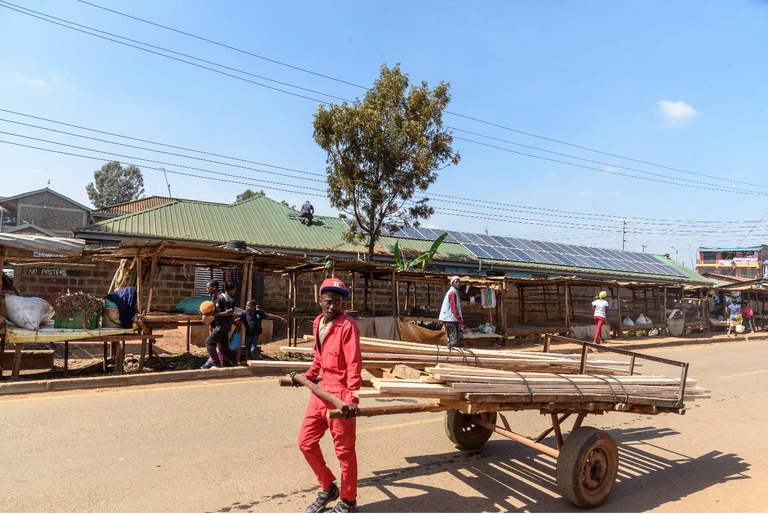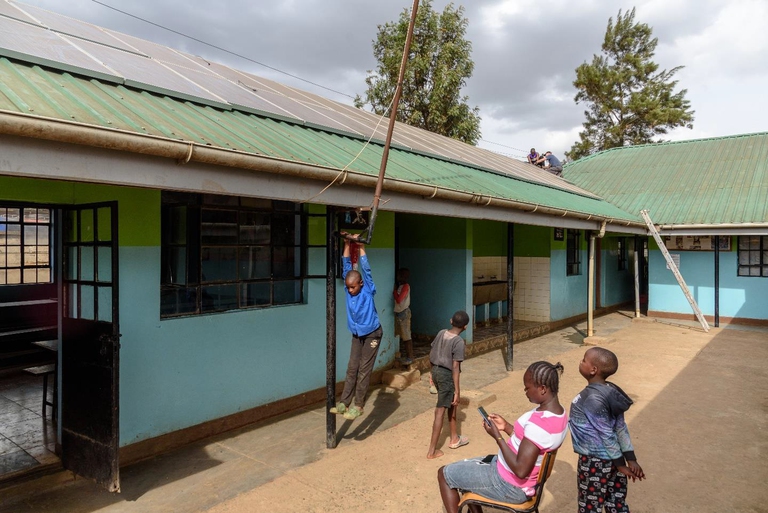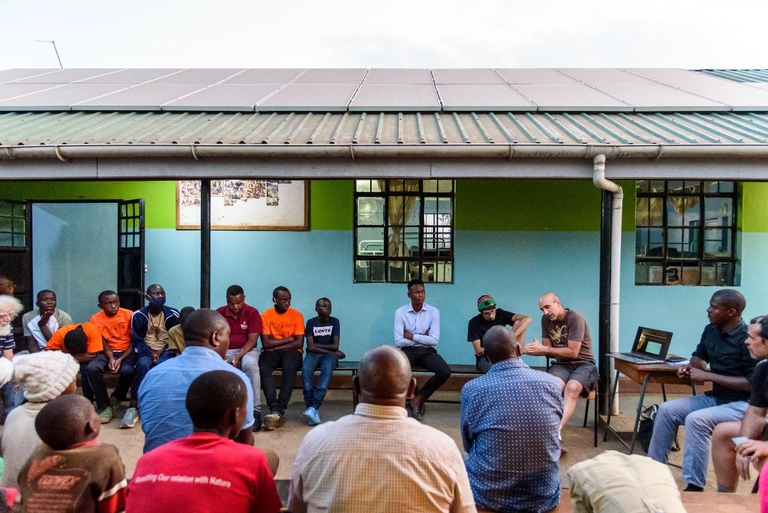https://www.lifegate.it/solare-fotovoltaico-africa-amani
- |
- The Italian NGO Amani has installed two photovoltaic systems on the roofs of the Casa di Anita and Kivuli Center reception centers in Nairobi, the capital of Kenya, where it has been working to save boys and girls from the streets for over 20 years.
- The benefits obtained exceed the enormous efforts made for their installation:savings on bills, autonomy in the event of a blackout, culture of rational use of energy.
- In the future there is a desire to improve the efficiency of the centers and promote a law that allows the surplus of solar energy produced to be fed into the grid.
On the slopes of the hills of Ngong, about 25 kilometers from the center of Nairobi, in Kenya, far from the noise of traffic and jarring contrasts, the ringing of the alarm clock warns you little girls and the girls from the Anita's house that it's time to go to school.At 4 in the morning the shelter comes alive, the young women go there shower and prepare to face a new day.Behind what to some may seem like a gesture simple, there is actually a lot of work, in this case a commitment made for years bynon-profit association Amani, based in Milan, together with the local organization Koinonia Community.
Clean and accessible energy for all:the Amani project in Africa
To ensure what theUN he set as the seventh god 17 Objectives for the ssustainable development contained in the action program ofAgenda 2030, or "Clean and accessible energy”, since 2014 Amani has been working to make reception structures in Africa efficient, not only Anita's House but also the socio-educational project for street children Kivuli Centre in the suburban area of Nairobi, explains the head of the project office Chiara Avezzano.
Compared to other cities, such as Lusaka in Zambia, where Amani has been managing shelters since 1995 to offer concrete alternatives to people otherwise forced to live in slums, in Nairobi on the cost of electricity is very high, “absorbs about 10 percent of the ordinary budget we spend on shelters,” explains Avezzano.To best invest its resources, the association has decided to exploit its solidarity network and install a Photovoltaic solar system on the roof both of Anita's House, consisting of a play area, a cistern for collecting water, kitchen with wood-burning oven and vegetable gardens, and of the Kivuli Centre, where there are craft workshops for professional training, tailoring, community radio, school languages and IT, small medical dispensary.

Costs, installation and benefits thanks to the solidarity network
In 2015 the inspection of the reception homes with the support of Matteo Leonardi, node of the solidarity network, to evaluate the consumption of the two sites, i costs for theinstallation and the benefits achievable:“While in Kivuli it was easy to decide where to place the panels, for Anita's House we had to think about the potential damage that the foliage would cause to the panels.In addition to dust:there is much more than in Italy!”, adds the manager of the Amani project office.
Crucial for the start of the project asbestos removal from the roofs, possible thanks to the 8 per thousand funds of the Waldensian Church and the Milanese company Lemar Spa, and the search for economic resources:“We accidentally met the president of the Automobili Lamborghini donation committee who, after listening to our project, decided to donate 178 solar modules still in perfect working order, removed two years earlier from the Sant'Agata Bolognese plant for expansion works".Once the panels were received from the owner company Evolvere spa, the solidarity machine continued to move to find them missing parts to the construction of the systems:“the company ZCS-Zucchetti Centro Sistemi spa, for example, provided theinverter and the lithium batteries for Anita's House, at cost price, and for the Kivuli Center.Thanks to the intercession of Mbs consulting, we then obtained from climate fund of the Finnish company EKOenergy the financing for the purchase of the missing products for the organization of the containers from Milan to Nairobi".Only after two years, in January 2021, "we managed to get the containers, previously stored free of charge in the spaces of the Rimaflow social cooperative.The Covid-19 pandemic has slowed down the organization and transport of materials."

Once on site, three engineers from the executive partner Ecorisoluzioni “they took care of the installation and training of a local technician, who will take care of maintenance.One of our secret dreams is to establish a single figure, currently non-existent in this area, which brings together the skills related to maintenance and installation".For the Kivuli Center a was chosen system with 29.7 kilowatts (kW) of power And 22 kilowatt hours (kWh) of storage, in Anita's house, smaller and with fewer services, one was enough 6.3 kWp And 9 kWh of storage.In both cases it is about hybrid systems, which provide for the automatic withdrawal of electricity from the grid when that from the sun is not available, and decidedly larger than the off-grid ones usually used by tenants of rural houses, who cannot afford the installation of a similar system.“We are looking for other places where panels of this size have been installed to push the Kenyan government to approve a rule that allows feed the surplus electricity produced into the grid”.
Renewables and energy efficiency:a viable path thanks to the culture of saving
“From February 2022 we will see economic, rather than environmental, feedback:with the first bill we have saved around 600 euros.And it is only the first step to promote the use of renewable sources and to make our centers more efficient, also through remote monitoring of consumption”.The next steps towards energy efficiency?“Check consumption to understand how to avoid peaks.We first want to install a timer at the water pump, so that it works during daylight hours, and replace electric boilers with a solar thermal system.We cannot change the consumption habits of girls and boys who wash themselves at four o'clock before going to school, but we can adopt more efficient technology that allows us to reduce costs."
The benefits of adopting intelligent systems for remote monitoring of the plant also concern the possibility of alerting the local electricity distributor, Kenya Power, of the misalignment between real and estimated consumption, “so as to better manage bills”.Energy autonomy is also important in the event of – frequent – malfunctions e blackout:“When there is no electricity, the system automatically turns off all the lights except the main ones:in Kivuli those that illuminate the office, the living quarters and the rooms used for the study of children and teenagers;at Anita's house the office, the freezer and the areas where the girls follow their afternoon activities".

“Consumption is calibrated on supply and not the other way around:we will not stop promoting meetings with the local population to make them understand how to rationally use these resources".Promote it among the local population culture of rational use of electricity it is an activity constantly managed by Amani, which promotes the sustainable rebirth of the territory and offers new opportunities for growth, including work, to boys and girls who are no longer lost.
